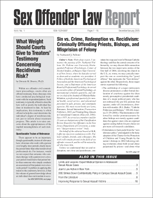Supreme Court of Ohio Deems State’s SORNA Law Punitive and Unconstitutional
Author: Amy Borror.; Brooke M. Burns.; Katherine A. Szudy.
Source: Volume 12, Number 06, October/November 2011 , pp.83-85(3)

< previous article |next article > |return to table of contents
Abstract:
On June 30, 2007, then-Governor Ted Strickland signed into law Ohio Senate Bill 10 (S.B. 10), legislation that would ultimately lead to Ohio being declared the first state in the nation to have substantially implemented Title I of the Adam Walsh Child Protection and Safety Act, the Sex Offender Registration and Notification Act (SORNA), P.L. No. 109-248, 120 Stat. 587, codified at Section 16901 et seq., Title 42, U.S. Code. Four years of intensive litigation ensued, challenging the constitutionality of S.B. 10. On July 13, 2011, the Supreme Court of Ohio ruled that S.B. 10, as applied to defendants who committed sex offenses prior to its enactment, violates Section 28, Article II of the Ohio Constitution, which prohibits the General Assembly from passing retroactive laws. ( State v. Williams, No. 2009-0088, slip op. 2011-Ohio-3374, 2011 Ohio LEXIS 1797 (Ohio Sup. Ct. Jul. 13, 2011).) By effectively derailing Ohio’s effort to modify compliance requirements for SORNA, the Williams ruling carries potentially significant implications for federal efforts to control the content and operations of state sex offender registries.Keywords:
Affiliations:
1: Office of the Ohio Public Defender; 2: Office of the Ohio Public Defender; 3: Office of the Ohio Public Defender.